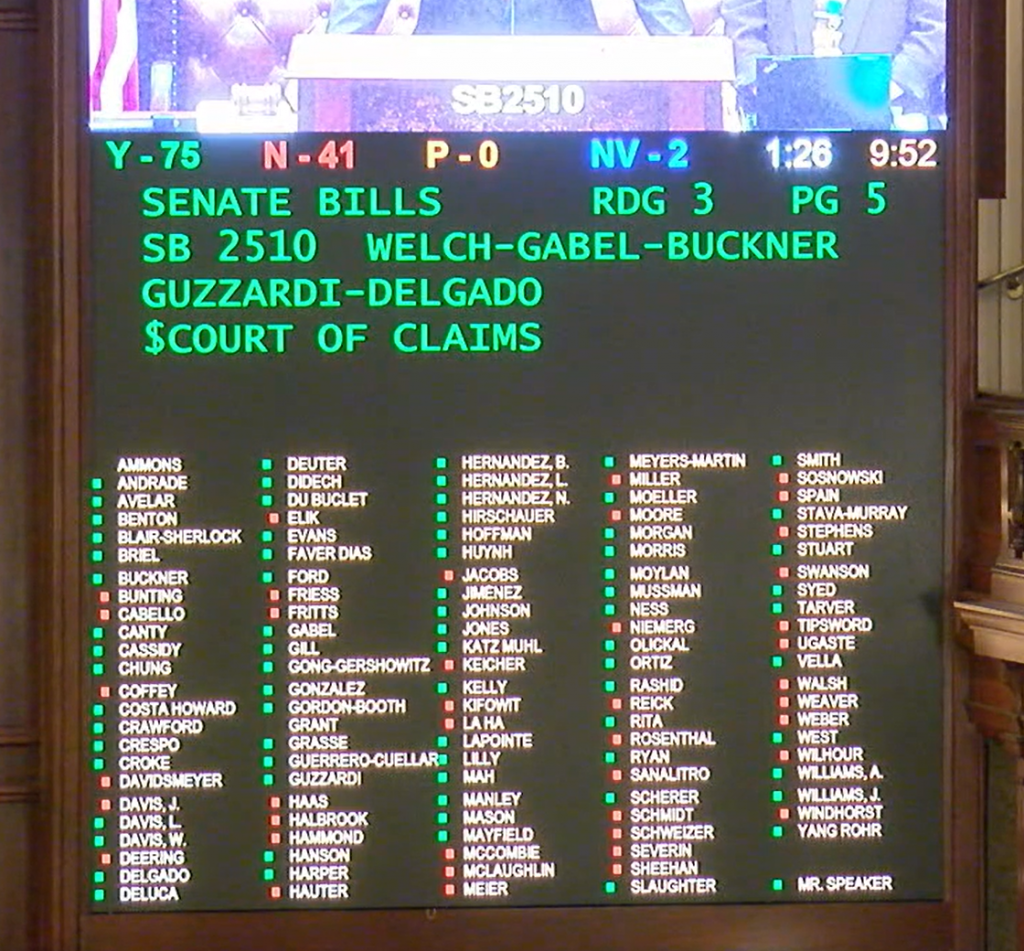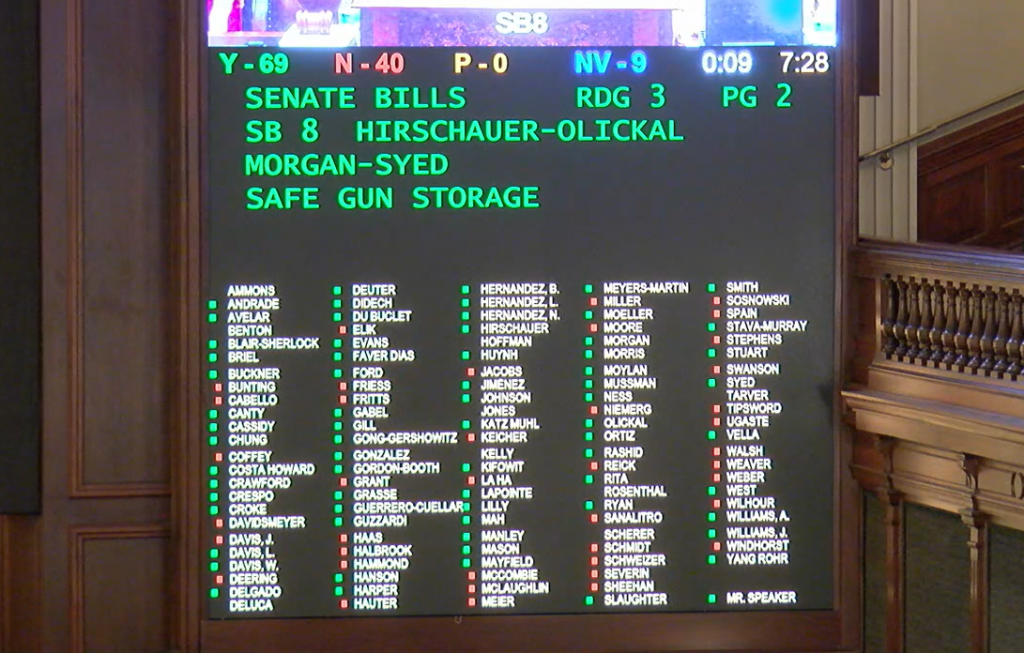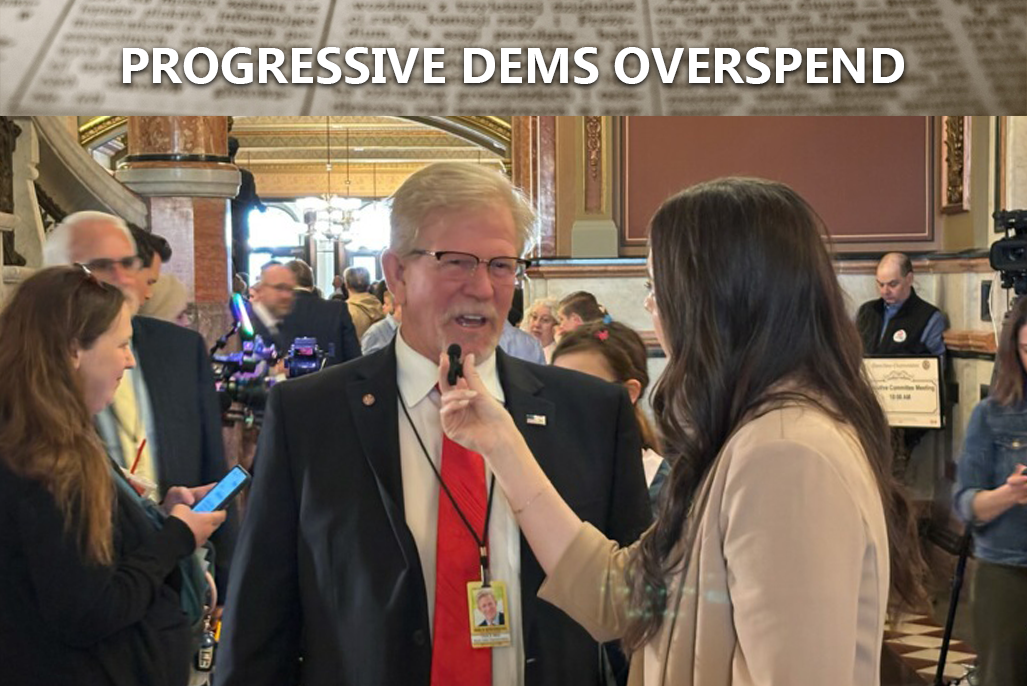The FY26 budget is filled with pork projects, more taxes, and more spending. Illinois has yet again, presented a portfolio to the rest of the nation on how ‘NOT’ to operate a state to create economic growth and opportunities. Illinois residents and businesses have suffered for consecutive years under the Pritzker regime and they are voting with their feet. When Pritzker took office, he hit the ground running to spend taxpayer funds recklessly and has grown the state budget by 38% in just a few years.
This year is no different as working families brace more taxes being stripped from their wallets to fund illegals, Democrat pork projects, and useless government jobs. It’s no surprise the progress Democrats rely on taxes, because they have no clue how to run a business, how to create opportunity for economic grown, or how to say NO to handouts. To make matters worse, they have doubled-down on their bad policies that are destroying the great state of Illinois.
Democrats Pass $55.2 Billion Budget
Another year, another budget, and another record-breaking spending increase.
Just before midnight on the last day of the legislative session, Illinois House Democrats passed the FY26 budget that will cost taxpayers more than $55.2 billion, a $2 billion increase over last year.

State spending under Governor Pritzker has grown exponentially since he took office in 2019. When he took over as Governor, state expenditures were $40.3 billion. Each year since we have seen state spending grow and we now have a budget that is $15 billion higher than when he took office.
When Governor Pritzker delivered his Budget Address in February, he said, “If you come to the table looking to spend more – I’m going to ask you where you want to cut.” (Complete Lie)
So much for that sound bite. The newly passed budget contains $1 billion in tax hikes and fund sweeps to pay for new spending, pork barrel projects for Democrats, and pay raises for politicians.
For consecutive years, the ‘tax and spend’ Democrats have negotiated spending plans behind closed doors, excluded Republican input, rejected accountability, and raised taxes on Illinoisans in order to quench their never-ending thirst to spend more money.
House Republicans have repeatedly offered to work with the majority party to craft a balanced budget without tax hikes, but were once again completely shut out of the process.
Its perfectly clear Democrats have no fiscal restraint and failed to implement any structural reforms. They even rewarded themselves with hundreds of millions in pork projects and a big fat pay raise for politicians in the budget. All on the taxpayer’s dime.
$1 Billion in New Taxes and Fund Sweeps
The $55.2 billion budget for Fiscal Year 2026 is reliant on one-time revenues and a billion dollars in tax hikes and fund sweeps.
The Budget and Revenue Package consisted of three major components:
- FY26 Budget Appropriations – SB 2510
- FY 26 Budget Implementation Bill (BIMP) – HB 1075
- FY 26 Revenue Package – HB 2755
Democrats imposed a laundry list of new taxes and money was swept from dedicated funds paid for by user fees to prop up the Democrats’ wasteful spending.
Ultimately, Democratic lawmakers voted to raise their own pay, impose new taxes, and make life in general a lot more expensive for already cash-strapped Illinois taxpayers.
Below is a list of major revenue changes that were included as part of the FY26 budget, which includes tax increases, fund sweeps, pauses in statutory transfers, among other items.


FIREARMS
House Republicans Vote to Protect the Rights of Law-Abiding Gun Owners, Stand Against Unconstitutional Storage Restrictions
State Representative Chris Miller says the bill is disgraceful and legal gun owners are yet again being used as a target by Democrats.

“The radical Democrats continue their attacks on legal gun owners in Illinois and Senate Bill 8 is another bill that infringes on our Second Amendment Rights,” said Miller. “These people are literally targeting legal gun owners who enjoy hunting and gun owners who feel safe knowing they can protect their property and family if needed. This bill is garbage and is nothing more than a control grab by people who likely don’t know anything about guns or gun storage.”
State Representative Patrick Windhorst issued the following statement after Republicans voted NO on Senate Bill 8 and House Bill 850 late Wednesday evening. The House Republican Floor Leader cited serious constitutional concerns for the rights of law-abiding gun owners.
“Senate Bill 8 is an overreaching and constitutionally dubious attempt by the majority party to further restrict the Second Amendment rights of responsible Illinois citizens,” said Windhorst. “This bill creates excessive and confusing firearm storage mandates, subjects law-abiding gun owners to stiff civil penalties, and places them at risk of prosecution for simply exercising their right to self-defense.”
Senate Bill 8, also known as the Safe Gun Storage Act, imposes new mandates requiring gun owners to store firearms in locked containers when in the presence of minors, prohibited persons, or so-called “at-risk” individuals.
Additionally, SB 8 requires gun owners to report stolen firearms within 48 hours or face civil penalties, despite most gun owners already acting responsibly and taking such steps voluntarily. Windhorst also raised alarms about a provision that gives greater Second Amendment rights to non-residents transporting firearms through Illinois than to state residents themselves.
CONSUMERS
Controversial ‘swipe fee’ delayed for one year
In a last-minute move, a massive change being imposed by the State of Illinois on Illinois consumers who use credit cards was delayed for one year. The controversial ‘swipe fee’ law would ban financial institutions that issue credit cards from imposing a fee on the retailers that accept these credit cards for use in Illinois. The law was enacted in May 2024 for implementation this year.
For complex legal reasons, this ‘swipe fee’ law is entangled with the transactions on which an Illinois State sales tax is collected. This would create a complex and snarled situation in which a transaction could be fee-imposed and taxed in two separate categories depending on the sales tax applicability of each transaction. An especially ugly scenario arose with respect to food service transactions, where it appeared likely that implementation of the controversial ‘swipe fee’ law could require many Illinois consumers who use their credit cards at table-service restaurants to run their cards twice, once for the meal and once for the service fee or tip paid to personnel. The action by the Illinois General Assembly to delay implementation of the ‘swipe fee’ does not make this law go away; its implementation has been ‘paused’ for one year. This debate will continue into the 2026 spring session.
TRANSPORTATION
No Action Taken on Chicagoland Mass Transit Crisis
With public transit agencies in Chicagoland facing a fiscal cliff and the potential for thousands of layoffs, the state did not pass a bill that would have provided the agencies with potentially over $1 billion in new funding.
A version of the bill passed in the Senate, sponsored by Sen. Ram Villivalam, D-Chicago. But the House adjourned early Sunday morning without concurring as some of its tax hikes became too controversial. Now, the future of Chicagoland transit is in limbo as the bill awaits further action.
The Regional Transportation Authority — which oversees the Chicago Transit Authority, Metra commuter rail and Pace Suburban Bus — projects a $771 million annual operating budget shortfall.
At a hearing in the days leading up to adjournment, Amalgamated Transit Union political director Clem Balanoff told lawmakers that thousands of union bus drivers and train operators would be laid off if action wasn’t taken to fill the budget gap. RTA officials have estimated 40% service cuts are necessary to address the fiscal crisis. […]
The Senate’s proposal to do so included statewide taxes on deliveries and electric vehicle charging, as well as expanding taxes on rideshares and expanded certain Chicago taxes to the rest of Cook County and surrounding counties.
RTA and its subsidiary transit agencies will create their budgets for the upcoming fiscal year in the coming weeks. According to RTA spokesperson Tina Fassett Smith in a statement, those budgets “by law must only include funding we are confident the system will receive in 2026.”
Between the governance and the revenue portions – the transit system’s fiscal cliff is approaching. A wide variety of major decisions as to how public transit is run, how it can be reformed, and ultimately how it can serve residents better remain since nothing was done this session.
Tax Increases Not Included…for now!
Below is a list of revenue items that were being actively discussed this spring in an effort to close the budget gap, or fund mass transit. While these tax increases failed to pass, these items could likely be brought back to life during Veto Session or when the legislature next adjourns.

